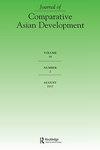发展政策的有效性
Q3 Social Sciences
引用次数: 1
摘要
摘要本文运用半开放的二元经济发展模型来解释为什么非洲国家在过去选择了对抗比较优势的发展战略,而东亚和东南亚国家则选择了相对优势的发展战略。本文认为,这两个地区所选择的政策的差异部分是由于前者的主要粮食部门相对于后者的表现较差。来自这两个地区的经验证据支持这一假设。其政策含义是,如果发展政策要取得成功,就必须解决粮食问题。本文章由计算机程序翻译,如有差异,请以英文原文为准。
The Effectiveness of Development Policy
Abstract This paper utilizes a semi-open dualistic model of economic development to explain why African states have in the past chosen to follow comparative advantage defying strategies of development while East and Southeast Asia have chosen comparative advantage following strategies. It will be argued here that the difference in policies chosen by these two regions is partly the result of the poor performance of the food staples sector in the former relative to the latter. Empirical evidence from both regions is provided to support this hypothesis. The policy implication is that the food problem must be solved if development policy is to succeed.
求助全文
通过发布文献求助,成功后即可免费获取论文全文。
去求助
来源期刊

Journal of Comparative Asian Development
Social Sciences-Political Science and International Relations
CiteScore
1.30
自引率
0.00%
发文量
2
期刊介绍:
The Journal of Comparative Asian Development (JCAD) aims to offer the most up-to-date research, analyses, and findings on the many aspects of social, economic, and political development in contemporary Asia conducted by scholars and experts from Asia and around the world.
 求助内容:
求助内容: 应助结果提醒方式:
应助结果提醒方式:


